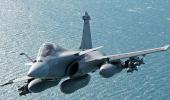
As the indigenously developed Airborne Early Warning and Control System (AEW&CS) 'Netra' was inducted into the Air Force on Tuesday, a group of women scientists were smiling from ear to ear as their hard work of more than a decade was finally seeing the light of the day.
The AEWS&CS was developed by the Centre for Airborne Systems, a laboratory under the Defence Research and Development Organisation headed by woman scientist J Manjula.
Netra has the capability to detect hostile missiles and jets at land, sea and air within the range of 200 kms. It is mounted on a Brazilian Embraer-145 jet.
"The system has much more capabilities than what Pakistan currently has, it is also relatively cheaper," said DRDO chairman S Christopher.
Interestingly, a chunk of the work related to the project was done by women scientists. This was acknowledged by Air Force chief B S Dhanoa during the induction ceremony at the Yelahanka air base in Bengaluru.
The Netra project is headed by Rajlaxmi who has been working with the DRDO for the last 28 years. She was a part of the project since its inception in 2004.
Another senior scientist Manisha Sharma worked on the system integration and communication, while scientist Bhagyalaxmi looked after computer mission of the project.
"It is only in DRDO you can find women scientists heading laboratories in such large numbers," Manjula said.
At least two DRDO labs are headed by women.
Another system similar to Netra will be inducted into the Air Force in coming months.
Photograph: Ministry of Defence










